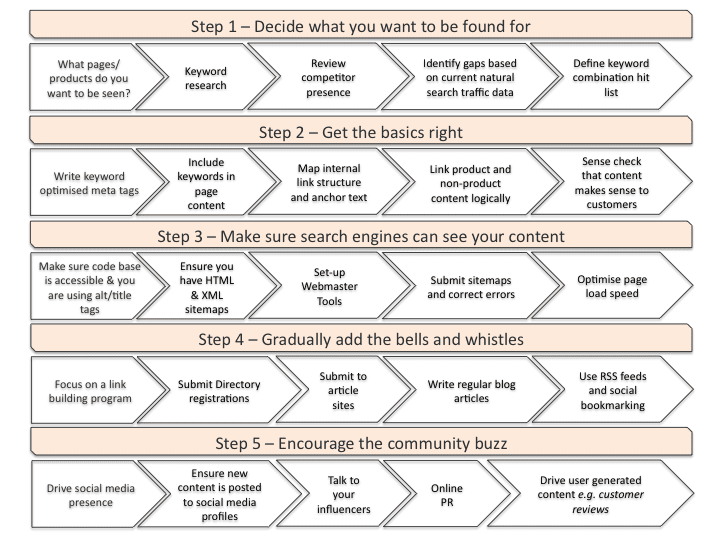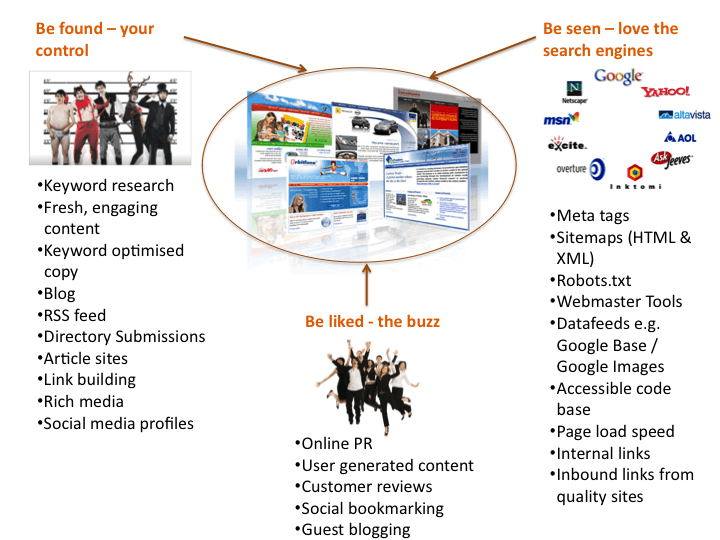I was recently putting the digital world to rights with digital marketing consultant James Gurd (James on Linked In, James on Twitter). We were talking about the ongoing need for straightforward advice on SEO for small and medium businesses who are new to SEO. We both felt there is still too much complexity and too many myths. James finds that when talking to clients that many still want to get to grips with SEO essentials so they can can focus their investment working with their SEO agency on advanced strategy.
So I'm delighted that James has offered to share his approach to cutting through the complexity - I hope it provides useful frameworks and interesting reading for marketers grappling with the basic success factors for SEO and also for consultants and agencies grappling with explaining it.

A five step SEO Strategy framework
Key SEO strategy areas
Question 1: What are the components of site optimisation?
It"€™s essential to understand what influences your website"€™s visibility in search engine results. Search engine algorithms update frequently and strive to provide the best customer experience, so the demands on website owners to match this aspiration has increased accordingly.
Site optimisation is more than pure SEO "€“ it is a blend of technical, marketing and customer service skills that aim to satisfy the demands of search engines and customers.
I like to split this into 3 challenges (Be found, Be seen, Be liked) and the chart below gives examples of what falls into each area.

The meta tag myth
Questions 2: Should I bother with meta tags?
Yes you should. Why? Because I"€™ve seen brands with limited page 1 presence in Google quickly hit page 1 for relevant keyword searches within a couple of weeks simply by optimising page content with a focus on page title [Editor: Also known as the browser title and indicated in code by <title></title> this can be thought of as overall or meta data about the document, but isn't strictly a meta tag] and description.
It"€™s true that meta tags aren"€™t as important as they once were but they still contribute to your overall site optimisation efforts for two important reasons:
- Search engines read the page title <title></title> and on-page content to help make up their minds what keywords your pages are most relevant for
- The page title and description are the two key pieces of information (assuming you"€™re not yet using things like rich snippets to boost results) that people will see when they review search results and the words you put there go a long way to influencing their click decision.
You can easily test different styles of meta description to see what most appeals to your audience "€“ use engagement metrics within your web analytics (see below) to see how changing this can subtly influence performance.
[Editors note: But don't agonise about your meta keywords since Google doesn't use these as a ranking factor and never has since 1998. Still it's useful to see what your competitors are targeting]
A strategic approach to improving SEO
Question 3: Where do I focus my efforts?
The million-dollar question. I recommend starting with your current web analytics data "€“ what are your natural search trends at keyword level and which keywords are not driving enough traffic despite you having a strong product range online?
Then take these keywords and products and run keyword research using a free tool like the Google Keyword Traffic Estimator. Find which keywords are trending and have significant local & global search volume "€“ match this back to your analytics data and identify opportunities.
Now make a keyword target hit list- this will form the basis of your optimisation. From here you can start to optimise your on and off-page efforts based on individual keyword targets. See the contextual framework above for an idea of how to attack this sequentially.
Link building strategy
Questions 4: How do I get started with link building?
My advice is to focus on non-paid links. Below are some of the ways to find people to link with:
- Use a tool like Tweetdeck or Hootsuite to set-up search filters for keywords and brands relevant to your website "€“monitor conversations, get involved and start talking to the most vocal people
- Run Google searches for relevant keyword terms and find websites that are complimentary and contact them directly to request a link
- Research bloggers in your market, review their blogs and contact those you like and that have a good traffic level "€“ give them something of value in return for talking about your website and linking
- Run a link check on your competitors (use Yahoo search and type in the command link:www.competitorsite.com) "€“ find the sites that could add value and contact them to build a relationship
- Produce articles and submit these to article submission sites like Buzzle.com (just make sure you submit to a relevant site, you don"€™t want to be seen to be spamming sites with untargeted content)
- Make sure you put social bookmarking on all product and content pages of your website to encourage people to share your content.
Make sure you optimise anchor text to be as relevant as possible to the landing page on your website. You will need to dedicate time to link building every week "€“ it needs patience and perseverance because not everyone will instantly respond to your approach.
Using Analytics to improve SEO
Question 5: How do I know what"€™s working?
Getting the right clicks is just one part of intelligent site optimisation. You need to know what happens to the traffic when it arrives on your site. If you drive high organic traffic but people don"€™t like what they find and bounce straight off your website, Google will measure and adjust its rating for your pages accordingly.
The basics to analyse at organic keyword level:
- Bounce rate
- Time on site
- Page views
- Goal completion
- Conversion
By doing this at keyword level you can see which keyword combinations are adding the most value and where you have the greatest room for improvement. Alongside keyword research and using customer surveys/social media for direct customer insight, this will help you make sensible decision regarding your ongoing optimisation and content strategy,
Some final advice "€“ don"€™t look at your analytics until you know what you want to measure and report on. You have to be clear on what you are going to analyse otherwise you will get distracted by the myriad of eye-catching graphs on display and waste time on looking at data that can"€™t help you make commercial decisions. I know, I"€™ve been guilty of doing this before.








